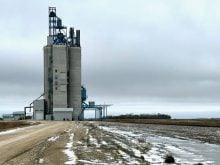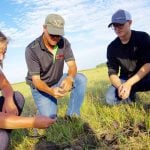KIEV, Ukraine – George Gruschenko sees the business opportunities that exist between Canada and Ukraine more clearly than most.
The trade commissioner at the Canadian embassy in Kiev has helped facilitate many of them, acting as a host in Ukraine and leading delegations to Canada.
His face is familiar to those at two major Saskatchewan shows – Canadian Western Agribition and the Western Canada Farm Progress Show.
He says Canadian faces should be more familiar in Ukraine.
“It’s possible to do business here in Ukraine,” he said.
Read Also

Internet of Things tapped for better emissions insights
Interconnected field sensor fleet allows better soil monitoring coverage and, hopefully, live insights on farm greenhouse gas emissions and nitrogen fertilizer application for farms.
“They should come personally here. They would better understand the realities in the market in Ukraine.”
Canadian farm equipment manufacturers have done well in Ukraine. For example, much of the short-line equipment manufactured on the Prairies suits the Ukrainian landscape, weather and desire to use better technology.
Names such as Sakundiak, Westeel, Bourgault, Flexicoil and Morris are well known here.
In the first eight months of 2008, Canadian machinery exports to Ukraine were worth $41 million, mostly from Saskatchewan.
However, Gruschenko has a word of warning – competition is heating up.
European companies in particular are becoming more aggressive and willing to take risks.
“Canadian companies, they always want to do a feasibility study. It wastes time.”
Gruschenko said he understands Canadian caution, but at the same time he thinks a little more risk would pay off.
When Canadian companies began courting the Ukrainian market, formal trade missions were required. Now, representatives from individual companies travel on their own because they know it is necessary.
Gruschenko said prairie companies need to learn how to make their equipment fit farming systems in Ukraine, Russia and Kazakhstan by talking personally to their equipment dealers. As well, it’s easier for representatives of Canadian companies to travel to Ukraine than it is for small Ukrainian farmers to get to Canada.
Gruschenko said Ukrainians are also looking for equipment and technology related to livestock. At Agribition this past November, representatives from Rise Corp., a leading agribusiness in Ukraine, were gathering information about the beef and dairy industries.
Gruschenko said Ukrainian agriculture is developing to a point where the country will be a strong competitor in some markets.
“This is reality,” he said.
“You have to co-operate to understand where your advantage is. If your competitor becomes a partner, that’s good.”
He said Canadian companies must decide where they fit in this emerging economy.
“Canadian companies should make some judgment about what is profitable,” he said.
“One piece of equipment means nothing. There should be a philosophy of how to use a chain of equipment.”
Canadians could also consider investing in Ukrainian agriculture.
According to the country’s ministry of agrarian policy, agribusiness has attracted more than $2 billion in direct foreign investment since 1992.
Topping the list of investors in agriculture is a country one might not expect – Cyprus – followed by Great Britain, the United States, Germany, Denmark, France and Russia.
The Netherlands leads investment in the food industry, followed by Cyprus, the U.S., Sweden, Great Britain, Germany, Switzerland and France.
Canada’s involvement has tended toward assistance through the Canadian International Development Agency and the prairie provinces’ Facility for Agricultural Reform and Modernization.















